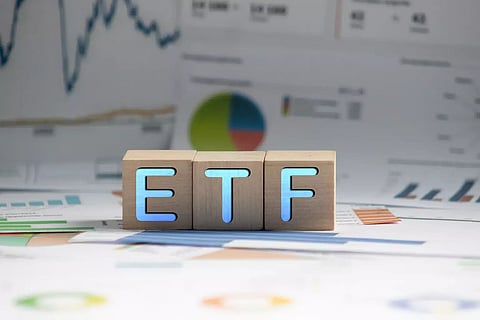
- Home
- Live Blog
- Breaking News
- Top Headlines
- Cities
- NE News
- Sentinel Media
- Sports
- Education
- Jobs

New Delhi: Unlike regular mutual funds, ExchangeTraded Funds or ETFs usually trade like ordinary stocks on a stock exchange. ETF's units are bought and sold through a registered broker of a recognized stock exchange and it is listed on the stock exchange.
The units of ETF cannot be bought and sold like any ordinary open ended equity fund as the units are listed only on the stock exchange.
An investor can buy as many units as he wants and there is no restriction from the exchange.
ETF is the fund which tracks the index of CNXNifty or BSE Sensex etc. Whenever you buy a share/unit of an ETF, you are buying a share/unit of a portfolio that tracks the gains and gains of its parent index. The main difference between ETFs and other types of index funds is that ETFs do not try to outperform their similar index, but simply replicate its performance. They don't try to beat the market; they try to be the market.
ETFs generally have higher daily liquidity and lower fees than mutual funds, making them an attractive option for the individual investor.
The first successful ETF was launched in the US in 1993 to track the Standard & Poor's 500 Index (S&P 500) and is one of the most traded ETFs to date. The first ETF was launched in 2001 to track the Nifty 50 index in India. ETFs are a cost-effective, passive alternative to mutual funds that empower an investor with exposure to the market and diversify their portfolio.
Unlike mutual funds that are actively managed by a fund manager, the predetermined objective of ETFs is not to outperform the market but to replicate the performance of the underlying index. In short, ETFs are a safer option to track the performance of the market through an index and invest accordingly.
Cost-effectiveness: Since ETFs only track an index without exceeding it, the administrative cost to manage it is much lower than the expense incurred by mutual funds.
Passive Management: Since ETFs are intended to mimic the market, the fund manager only needs to make periodic changes in line with the market index. This is a significant difference from mutual funds, where the fund manager continuously trades securities in baskets to beat the market.
Less Managerial Risk: Since ETFs are passively managed and tied to a particular index, they involve less risk of organizational errors. Here the investor does not need to rely on the judgment of the fund manager, like in mutual funds, to make consistently sound trading decisions. Instead, the investor is relying only on a self-stable market.
Diversification: Compared to mutual funds, ETFs are a cheaper vehicle to diversify a portfolio with exposure to the market.
Tax Effectiveness: Being passively managed and structured to mimic the market, capital gains and income from ETFs may not be high enough to push an investor's tax threshold.
No Minimum Investment: ETFs can be purchased in small amounts to measure the performance of a market index.
Sector Exposure: ETFs can use the exposure of any specific sector, allowing an investor to initially experience a part of an industry where they want greater openness in the future.
-- iShares MSCI India Small-Cap ETF Provides Diversified Exposure to Small Public Companies in India
-- Wisdom Tree India Income Fund (EPI) with focus on large Indian companies eligible for purchase by foreign investors
-- First Trust India Nifty 50 Equal Weight ETF tracks the performance of the most liquid securities listed on the National Stock Exchange of India
Also read: What is Digital Neo Bank And Its Benefits? Here's Everything You Need To Know
Also watch: